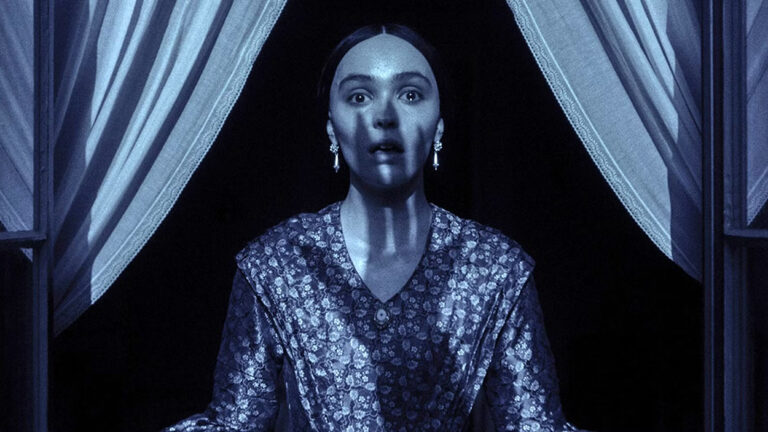
@Courtesy of Focus Features
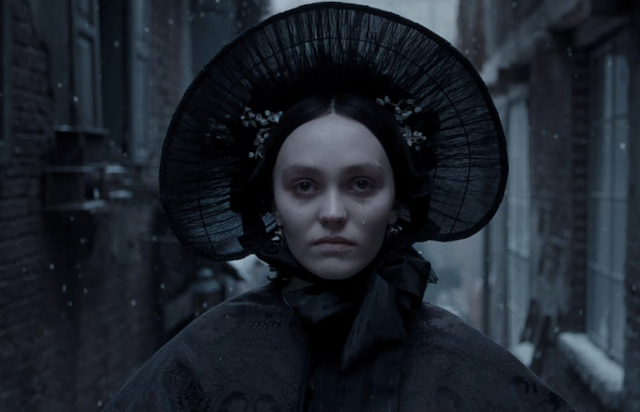
Q: Which was your first discovery of Nosferatu and how did that memory sit in your mind all over the years?
Robert Eggers: I first saw Nosferatu on a VHS when I was nine years old. Max Schreck’s performance and the makeup that he designed really struck me, as well as the haunting atmosphere and the way that Murnau and his screenwriter, Henrik Galeen, turned the Brak Stoker story into a very simple and enigmatic fairy tale. When I was in high school, I did a play of Nosferatu that I directed with my close friend Ashley Kelly Tata; it was black and white on stage, black and white makeup, black and white sets. The guy who owned a local theater in southern New Hampshire, he saw this play of ours and asked us to do a more professional version of it in his theater. That totally changed my life. It cemented that I wanted to be a director. Nosferatu is a large part of my identity as someone who is making creative work because of that experience.
Q: What was instead your understanding of Nosferatu?
Lily- Rose Depp: I’ve always been fascinated with this story. My brother and I used to watch Abbott and Costello to meet the monsters a lot when we were little. My brother became obsessed with Dracula, he started dressing up like Dracula all the time. He would only speak in this Transylvanian-like accent. That was a big part of my childhood. I also loved the more classical takes, Bela Lugosi, Christopher Lee. I’ve always been aware of the tale and when I heard that Rob was gonna make his version of Nosferatu. I was really excited because I’ve always been a huge fan of his work. I thought he was the perfect director to tell this tale.
Willem Dafoe: I can join the club of young people that loved horror and specific vampire tales when we were kids, those were some of the first movies I saw. Then I did in 2000 Shadow of the Vampire, very different from this movie, I played Max Schreck. That was a good experience. To prepare for it I studied a lot of the ’21 Murnau version of Nosferatu. I started by copying Max Schreck’s performance because we quoted that classic a lot in that movie. So I was very familiar with the material. I had worked with Robert two times before. I had a wonderful time. I knew he had Nosferatu on his mind even before I think we did The Lighthouse together. So I was very happy when he called and he said, “Look, we’re going to do this. Would you like to play this character of von Franz?” It is an invented character and I liked it very much. I liked the script very much, I imagined that Rob had a good time writing it because I think that would be the role that he would play.
Q: Can you talk about the decision to tell the story from the female perspective, through Ellen’s character?
Robert Eggers: That’s another thing that is so remarkable about the original film In Stoker’s Dracula, the vampire is going to England seemingly for world domination. Mina and Lucy just happened to be there. In the Murnau film he’s going there for Ellen, and it emerges as Ellen’s story by the end of the film. So I thought: what if it’s her story from the very beginning? In that period it was thought that people who are somnambulist were able to tune into another realm. Turn into the spirit realm, the dark realm. That was really exciting because I got to explore her “hysteria” and her melancholy and the ways in which she’s an isolated figure who doesn’t fit into 19th century society. She is as much a victim of 19th Century society as she is of the vampire itself. No one can understand her. She has a very loving relationship with her husband, but he can’t see this other side of her. The one person she does find a connection with, who can understand this other side of her is, unfortunately, a vampire. That makes for a very tragic love triangle.
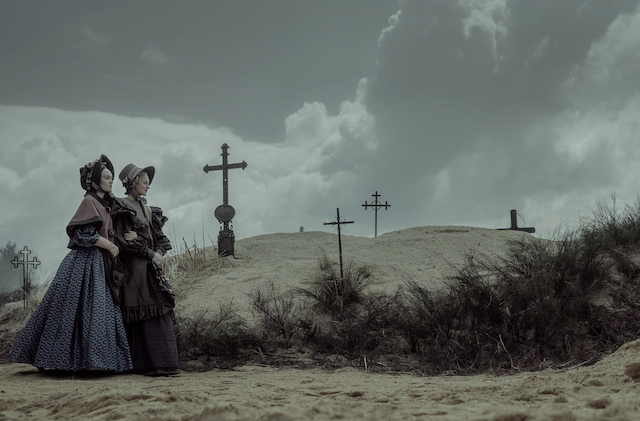
@Courtesy of Focus Features
Q: How did you prepare to play Ellen and come to understand her draw to this demon?
Lily-Rose Depp: There’s so many layers to her, which is obviously something that I was very excited about from the first moment. Telling the story from her perspective serves the purpose of deepening the story because when you see it from her perspective there’s so many more layers to it because it’s not just this demonic force that’s hell bent on killing everyone in sight. It’s carnal, lustful, complex and quite human desire there from the vampire side. It makes it so much more scary and complicated. It speaks to larger themes, it allows space for everyone watching it to attach their own meanings to it. Something I was thinking about a lot when constructing the character emotionally is that she is dealing with kind of an internal war, accepting aspects of herself that the society she’s living in has no room for. Coming to terms with the darkness within herself, she’s desperately trying to suppress it. What’s beautiful about Ellen’s relationship with von Franz is that he gives her the opportunity to do a good deed with this part of her. It speaks to larger human beings of just accepting things within yourself that are hard to accept.
Q: Can you talk about that decision of using only practical special effects and no CGI?
Robert Eggers: The physical performance is where you see that internal war. You see her literally at a breaking point. There are drawings of hysterical poses in the 19th century, psychiatrists who studied hysteria had an illustrator make engravings of every hysterical attitude. We used those poses to structure Lily-Rose physical performance. I always wanted to seem like something that could be done because once it comes over the top, then you know that there’s effects involved, and then it’s not as scary. So it was very important to me that Lily’s physical performance.
Lily-Rose We worked on a lot with Marie-Gabrielle Rotie, our Movement coach, who is amazing. Nobody wanted a physical performance that looks beautiful on camera but is very choreographed. The way we were shooting was quite technical, it’s very much like a dance with the camera and the set and your co-stars. We wanted every single moment to be infused with a real intention, coming from a real place that was emotionally grounded. We rehearsed with the corset because that changes all of your movement and your breathing completely. found it really helpful because it helps you to get in the zone of what that person would be feeling or thinking. There’s something very emotional that comes with that movement, your body doing things that it’s not used to.
Q: Having already worked together before, do you feel like you established a shorthand that helped you when you were filming Nosferatu?
Willem Dafoe: ‘m there to manifest what Robert sees to it. That’s my job. That’s what I want to do. I have an interest in the things that he’s interested in, and he gives me wonderful things to do, feeds me on all this research, makes me learn things, opens the door for applying myself to the pretending. That’s a wonderful place to be for an actor. So when he calls, I come running.
Robert Eggers: There is a shorthand, we trust each other. The more we collaborate, the more we become extensions of each other and part of the same mind. It’s rewarding.
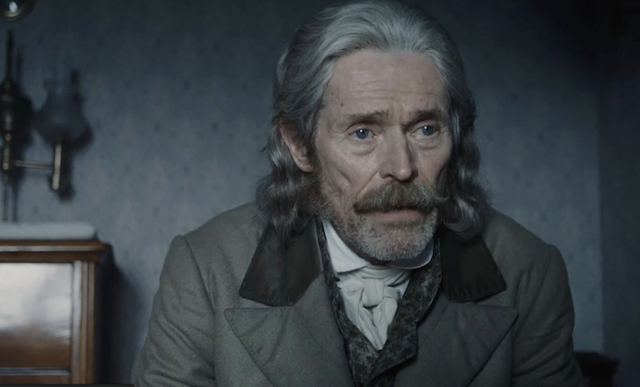
@Courtesy of Focus Features
Q: How did you come up with Bill Skarsgaard’s Creepy Voice?
Robert Eggers: That’s Bill. In the script I described something that Bill interpreted, a long paragraph about how he talks and Bill articulated that. I sent him some old Soviet movies, then Bill worked with an opera singer, a friend of mine, to lower his voice. The breath is also something that’s described in the screenplay, something Bill spent a lot of time developing. He would just send me recordings and we would toss ideas back and forth until we found something that we both loved.
Q: Your character’s fascination with the unknown feels so visceral. What part of his curiosity resonated most with you?
Willem Dafoe: He’s a man that studies. He’s a man that deals with the occult, deals with the unseen world, and he’s not necessarily embraced by society at that point. When he arrives to help with this problem, he’s kind of rejected, but he finds some sort of complicity and understanding in what he sees in Ellen’s character, and that was a very important part of von Franz. He struggles to reconcile the seen with the unseen, because he’s not getting a lot of support from people around him. Some of the irony, some of the humor comes out of that. There’s something beautiful about characters that have the outsider perspective because they see in a way that the others don’t see. They can often see the repression and the struggle of other people.
Robert Eggers: Willem and Aaron Taylor-Johnson, they play it straight. It doesn’t work if you try to play it for humor in this context. I like super depressing arthouse movies that make you not want to leave your house for two weeks. I’d like to make another one like that. But Nosfertu was intended for a broad audience. And so you need to let the steam out of the tension with a little bit of humor.
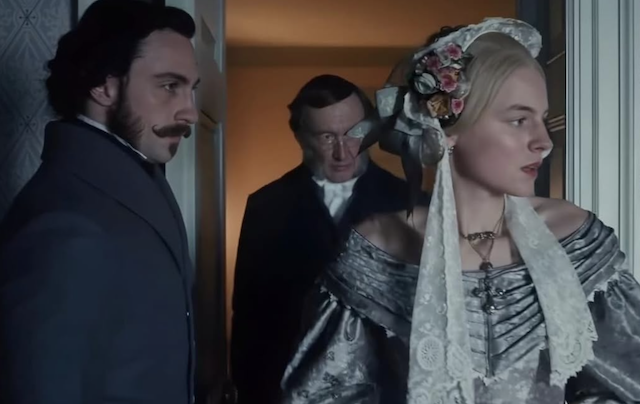
@Courtesy of Focus Features
If you liked the press conference, share your thoughts below.
Check out more of Adriano’s articles.
Here’s the trailer for Nosferatu:

